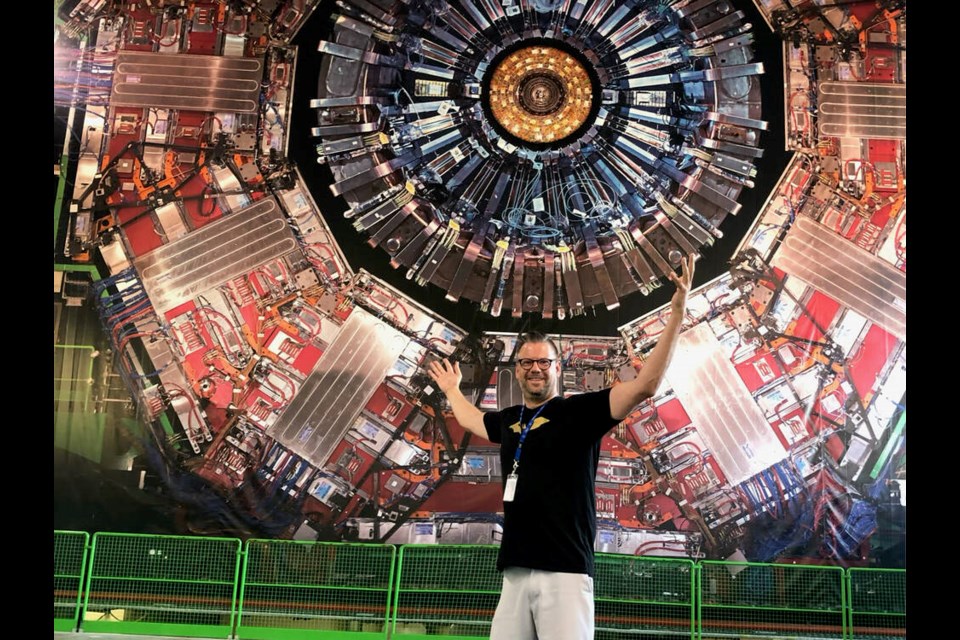Not everybody gets to rub shoulders with internationally-acclaimed physicists and watch experiments seeking to understand the origins of the universe.
But a Port Coquitlam high school teacher did just that on his summer vacation this month and is now hoping to take his experiences from a trip to CERN into his physics and STEAM (Science, Technology, Engineering, Art and Math) classes.
Edward Csuka, a Terry Fox Secondary physics teacher, is back from 17 days visiting CERN in Switzerland participating in an international conference for teachers sponsored by the Canadian Association of Physicists and the Institute of Particle Physics.
Csuka earned the all-expenses-paid 17-day trip after winning the Canadian Association of Physicists Award for Excellence in Teaching High School Physics for the BC/Yukon Region.
It was during his stay in the city-sized CERN complex — also known as the European Organization for Nuclear Research — that Csuka fulfilled a life-long dream.
“It was absolutely the dream trip.” Csuka told the Tri-City News. “CERN is the Disneyland for physicists.”
Huge experiments ongoing at CERN
CERN houses the world’s largest scientific experiment, the Large Hadron Collider (LHC), which accelerates protons to near the speed of light in two opposite directions with the goal of making discoveries predicted by theoretical physicists, like Albert Einstein.
By smashing the tiny particles together, the hope is that the world can learn more about the fundamental nature of the universe, said Csuka.
Among the successful experiments was the discovery of the Higgs boson in 2012 leading to a Nobel Prize for Peter Higgs.
Csuka got to sit in Higgs’ chair to watch a documentary on the LHC, called Particle Fever; he also got to visit Einstein’s home in Bern, Switzerland.
In Einstein’s house, where the physicist came up with some of his most important theories, Csuka got to drink coffee and soak up the genius’ vibe.
“I think some of it sunk in,” he joked.
But it was descending 100 metres underground to witness the scale and magnitude of the experiments in particle science with the Compact Muon Solenoid (CMS) that was among the trip’s biggest highlights.
The CMS is a detector that uses 3D cameras to photograph the activity of particles traveling at just under the speed of light.
From particle physics to solar eclipse
Csuka said it was a thrill to be so close to an actual working experiment which is helping to solve some of the mysteries of the universe, like why is the universe still expanding and what is dark matter.
He also enjoyed collaborating with teachers from all over the world who have similar interests.
What was so amazing is that scientists from all over the world — including from countries in conflict — were working to unlock the mysteries of the universe.
“It’s almost a utopian society, the politics go away, the differences and people work together to study the building blocks of the universe,” Csuka said.
Now he’s working on a large-scale experiment of his own.
Csuka is organizing the Solar Max International Research Expedition to study how animals react to daytime darkness during a rare total solar eclipse that takes place on April 8, 2024.
Thirty-five Terry Fox students will participate in the experiment by observing animal behaviour at the Dallas Zoo, which will be in the relatively narrow “path of totality” when the eclipse is at its fullest — and darkest.
Csuka is working with teachers in eastern Canada, as well as the U.S. and Mexico, in the hopes of getting as many as 10,000 students in three countries to take part by observing animal behaviour at zoos, aquariums and farms.
“We want to make it the world’s largest ever study of animal behaviour during a total eclipse.” said Csuka, who has been working on Solar Max for six months already and has a website.
Total eclipses are rare, Csuka noted, and an opportunity to study an astronomic event on earth in a similar way that CERN studies particles.
In both cases, the goal is always to use scientific experiments to find out how the universe works.
“There’s 95 per cent we don’t know what’s gong on….it’s a mystery.”
You can follow Csuka’s trip to CERN on Instagram @Edward.J.Csuka





